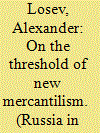|
|
|
Sort Order |
|
|
|
Items / Page
|
|
|
|
|
|
|
| Srl | Item |
| 1 |
ID:
153299


|
|
|
|
|
| Summary/Abstract |
Facchini uses a behavioural approach to analyse the political beliefs of French people, who he believes are ‘more or less incompetent’ in economics. In this article I focus on his premise that the public are incompetent and that therefore their views, such as being opposed to the market in the case of the French people, should be interpreted as ‘perception bias’. Other economists may echo Facchini, claiming that people who voted Leave in the UK and for Trump in the USA did so because their lack of economic knowledge contributed to an ‘anti-foreign bias’. However, I argue here that the existing empirical research showing that people lack economic knowledge is flawed. Many economists adopt a questionable approach to the interpretation of public knowledge and the evaluation of what knowledge is important.
|
|
|
|
|
|
|
|
|
|
|
|
|
|
|
|
| 2 |
ID:
140744


|
|
|
|
|
| Summary/Abstract |
Recent historical work has illustrated the importance of the Philippine-American War in the twentieth-century formation of American empire. These studies, however, tend to efface important tensions between political and economic forms of imperialism, seeing capital as merely another instrument of sovereign rule. In response, this article illustrates that wartime imperial encounters in the colonial Philippines from 1898 to 1903 troubled the capacity of American empire to hold authority over the disorder caused by a seemingly autonomous capitalist market. Indeed, the market appeared to the military colonial government as a force that could not only limit American authority, but could also upturn racial and labor hierarchies. Tensions over the market surfaced especially in and through: the fiscal policies of the occupying military government, the mundane daily interactions between Americans and local retailers in the cities, suspicions over foreign banks, and the disbursement of wages to soldiers. As a response to this threatening political and economic disorder, one of the first steps of the American colonial state was to employ publically renowned financial expert, Charles Conant, to institute a new Philippine currency system. Racial capacities of colonial subjects—both ethnically Chinese and “native” Filipinos—to understand the truths of the capitalist market and obey colonial authority consequently shaped Conant’s design for a new currency system.
|
|
|
|
|
|
|
|
|
|
|
|
|
|
|
|
| 3 |
ID:
139531


|
|
|
|
|
| Summary/Abstract |
In this paper, we provide one of the first systematic analyses of gender's effect on trade attitudes. We draw on a unique representative national survey of American workers that allows us to evaluate a variety of potential explanations for gender differences in attitudes toward free trade and open markets more generally. We find that existing explanations for the gender gap, most notably differences between men and women in economic knowledge and differing material self-interests, do not explain the gap. Rather, the gender difference in trade preferences and attitudes about open markets is due to less favorable attitudes toward competition among women, less willingness to relocate for jobs among women, and more isolationist non-economic foreign policy attitudes among women.
|
|
|
|
|
|
|
|
|
|
|
|
|
|
|
|
| 4 |
ID:
151543


|
|
|
|
|
| Summary/Abstract |
The Soviet Union broke up twenty-five years ago, therefore it does not make much sense to explain in detail how much has changed since then in the public mind, in politics, and in the economy. Any anniversary is an occasion to look back in an attempt to find answers to questions such as: What trends have prevailed? What have we, Russians, lost and what have we gained? And what impact has the disappearance of the Soviet superpower had on the rest of the world?
|
|
|
|
|
|
|
|
|
|
|
|
|
|
|
|
|
|
|
|
|